Select Works and Courses of John Frame (4 vols., 3 courses)
Digital Logos Edition
Overview
The Select Works and Courses of John Frame Bundle includes three books, three courses, and the complete theological correspondence from prominent theologian and philosopher John Frame. These books and courses will introduce you to important concepts related to philosophy, worldview, reason, ethics, and the clarity of Scripture. You’ll develop a more rounded understanding of these topics and explore how the Christian faith should influence the way you think.

Individual Titles
- CS101 Biblical Worldview and Critical Thinking
- CS211 History of Philosophy
- TH207 The Clarity of Scripture
- The Theological Correspondence of John Frame
- Nature’s Case for God: A Brief Biblical Argument
- Christianity Considered: A Guide for Skeptics and Seekers
- We Are All Philosophers: A Christian Introduction to Seven Fundamental Questions (shipping August 2019)
Product Details
- Title: Select Works and Courses of John Frame
- Author: John Frame
- Publisher: Lexham Press
- Publication Date: 2019
- Volumes: 4
- Courses: 3
- Video Hours: 6.5
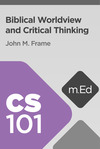
CS101 Biblical Worldview and Critical Thinking
- Instructor: John Frame
- Publication Date: 2018
- Video Hours: 4
In CS101 Biblical Worldview and Critical Thinking, esteemed Christian theologian and philosopher John Frame explores what it means to think like a Christian. He introduces philosophy, discusses reason and how to become a better thinker, and describes what goes into a worldview. Throughout the course, Dr. Frame emphasizes that “philosophy is a form of spiritual warfare,” stressing the importance of thinking about the world in a way that reflects God.
Contents:
Introduction
- Introducing the Speaker and Course
Unit 1: Christian Philosophy and Thinking
- Introducing Philosophy
- Philosophy and Becoming a Better Thinker
Unit 2: Critical Thinking
- Learning How to Reason
- Reasoning and Persuasion
- Dealing with Self-Deception
- The Relationship between Reasoning and Feelings and Emotions
Unit 3: Worldview
- What Is a Worldview?
- God, Atheism, and Worldview
- The Circular Nature of Knowledge
- Presuppositions for Christian Thinking
Unit 4: Perspectival Method
- Major Divisions of Philosophy
- The Three Perspectives of Divine Lordship
- Understanding God Perspectivally
- Is Perspectivalism Relativist?
Unit 5: Metaphysics
- Metaphysics: The One and the Many
- Teleology
- Cause, Effect, and Science
- Miracles and the Supernatural
- Human Mind and Body
- Theistic Proofs: Is There a God?
Unit 6: Epistemology
- Epistemology: Three Schools of Thought
- How Do We Know What We Know?
- Typical Definition of Knowledge
- Radical Doubt
- How Can We Know God?
Unit 7: Ethics
- Ethics: Three Non-Christian Views and Biblical View
- Making Value Judgments
- Relationship between Metaphysics, Epistemology, and Ethics
- Objections to Christian Ethics
- Love: The Highest Virtue
- Value and the Highest Good
Conclusion
- Conclusion to the Course
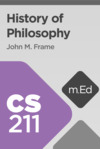
CS211 History of Philosophy
- Instructor: John Frame
- Publication Date: 2018
- Video Hours: 2
In CS211 History of Philosophy, John Frame presents a brief survey of philosophy. Beginning with the garden of Eden, Dr. Frame describes the development of thought and worldview, and he explores how different philosophies have reflected or influenced theology. This course will help you to understand the assumptions present in a range of worldviews and to be better equipped to interact with different ways of thinking.
Contents:
Introduction
- Introducing the Speaker and Course
Unit 1: Ancient Philosophy
- Philosophy in the Beginning
- Pre-Socratic Greek Philosophy
- Classical Philosophy: Plato and Aristotle
- The Apostolic Fathers and Early Christian Philosophy
- Medieval Philosophy
Unit 2: Modern Philosophy
- Early Modern Philosophy
- Immanuel Kant
- Liberal Theology: Part 1
- Liberal Theology: Part 2
- Nineteenth- and Twentieth-Century Philosophy
- Recent Christian Philosophy
Conclusion
- Conclusion to the Course
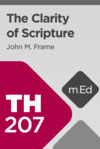
TH207 The Clarity of Scripture
- Instructor: John Frame
- Publication Date: 2018
- Video Hours: 0.5
The clarity of Scripture is a key part of the Reformation doctrine of Scripture. In this short course, John Frame considers what the clarity of Scripture means. He describes its origin and discusses it in light of three of God’s attributes: His sovereignty, His authority, and His presence. Dr. Frame also explains how to understand the clarity of Scripture when reading passages in the Bible that do not seem to be clear.
Contents:
Introduction
- Introducing the Speaker and Course
The Clarity of Scripture
- The Westminster Confession of Faith on the Clarity of Scripture
- Clarity and God’s Sovereignty
- Clarity and God’s Authority
- Clarity and the Spirit’s Presence
- Dealing with Apparent Unclarity
Conclusion
- God Has Spoken to Us; We Can Understand
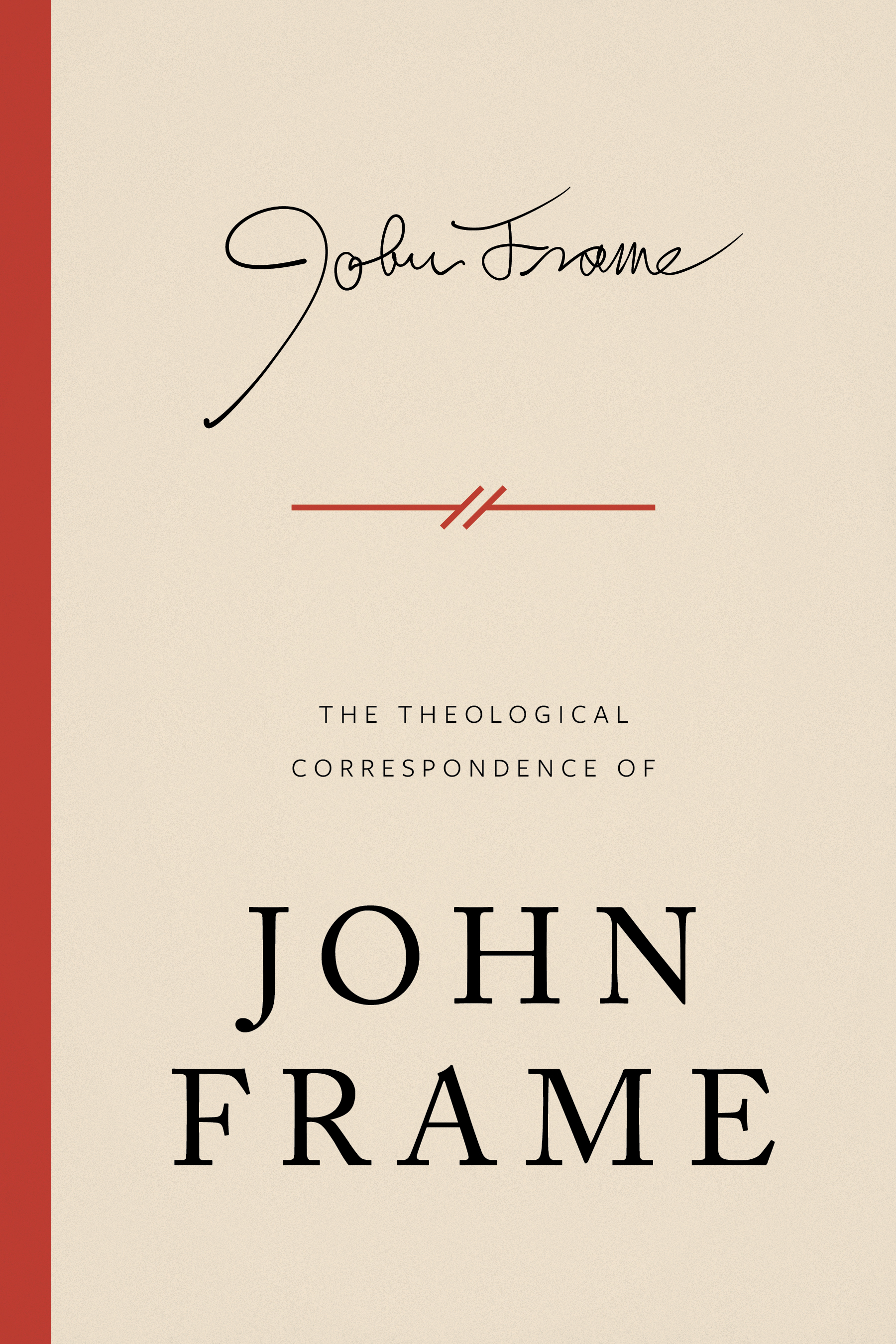
The Theological Correspondence of John Frame
- Author: John Frame
- Publisher: Lexham Press
- Publication Date: 2017
- Estimated Page Count: 1,000
Over the course of his noteworthy career as a theologian, John Frame corresponded prolifically with theologians, pastors, and students, answering their questions on matters of the faith, the church, and the practice of theology.
The Theological Correspondence of John Frame now makes this correspondence available exclusively through Lexham Press. More personal, but no less theologically robust than his academic work, Dr. Frame himself states that this collection of letters is the single most comprehensive account of his theological thought.
Ranging widely in topic and spanning over 300,000 words—the equivalent of three print volumes—Theological Correspondence contains letters that will be of value to any pastor, theologian or student, just as they were to the original recipients. Organized topically and fully tagged and cross referenced, this resource is now the best single account of Dr. Frame’s thought available and an invaluable tool for the study of theology in the Reformed tradition.
Contents:
Part One: Systematic Theology
- Introduction
- The Doctrine of God
- The Word of God
- Angels
- Man
- Election and Covenant
- The Person and Work of Christ
- The Spirit’s Application of Salvation
- Grace, Law, Obedience
- The Church
- The Last Days
Part Two: Philosophy and Apologetics
- Metaphysics
- Epistemology
- Ethics: The Antithesis
- The History of Philosophy
- Apologetic Methods
- Apologetic Problems
Part Three: Ethics and Miscellany
- Introduction to Ethics
- Ethical Decision-Making
- Christ and Culture
- God’s Commandments
- Miscellany
- Appreciation to Friends
- Personal Reflections
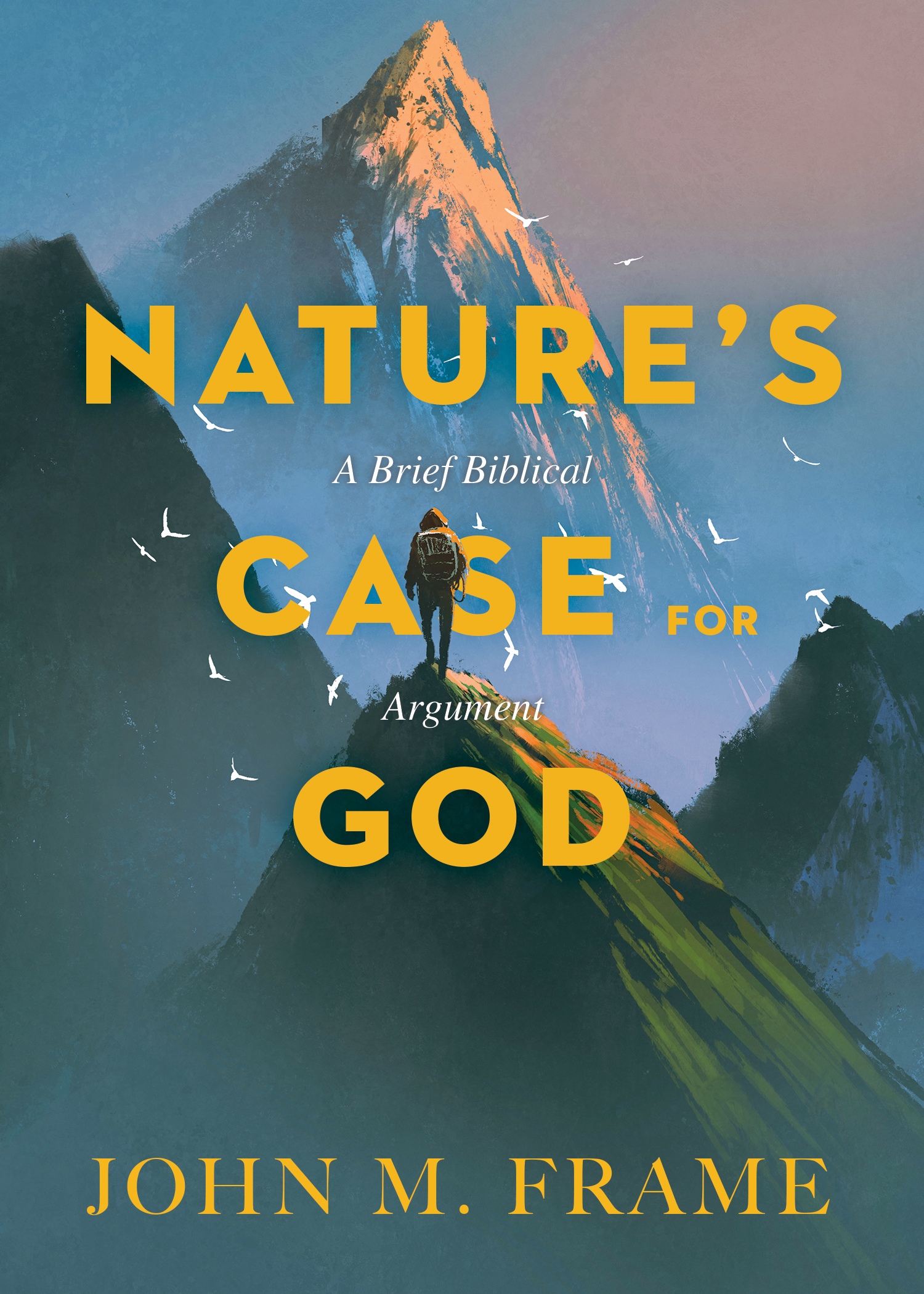
Nature’s Case for God: A Brief Biblical Argument
- Author: John Frame
- Publisher: Lexham Press
- Publication Date: 2018
- Pages: 96
Many Protestant Christians are suspicious of natural theology, which claims that we can learn about God through revelation outside the Bible. How can we know anything about God apart from Scripture? In Nature’s Case for God, distinguished theologian John Frame argues that Christians are not forbidden from seeking to learn about God from his creation. In fact, the Bible itself shows this to be possible.
In nine short and lucid chapters that include questions for discussion, Frame shows us what we can learn about God and how we relate to him from the world outside the Bible. If the heavens really do declare the glory of God, as the psalmist claims, it makes a huge difference for how we understand God and how we introduce him to those who don’t yet know Christ.
Contents:
Part One: The Witness of the Created World
- The Greatness
- The Oneness
- The Wisdom
- The Goodness
- The Presence
Part Two: The Witness of Human Nature
- The Seared Conscience
- The Accusing Conscience
- The Awakened Conscience
- The Good Conscience
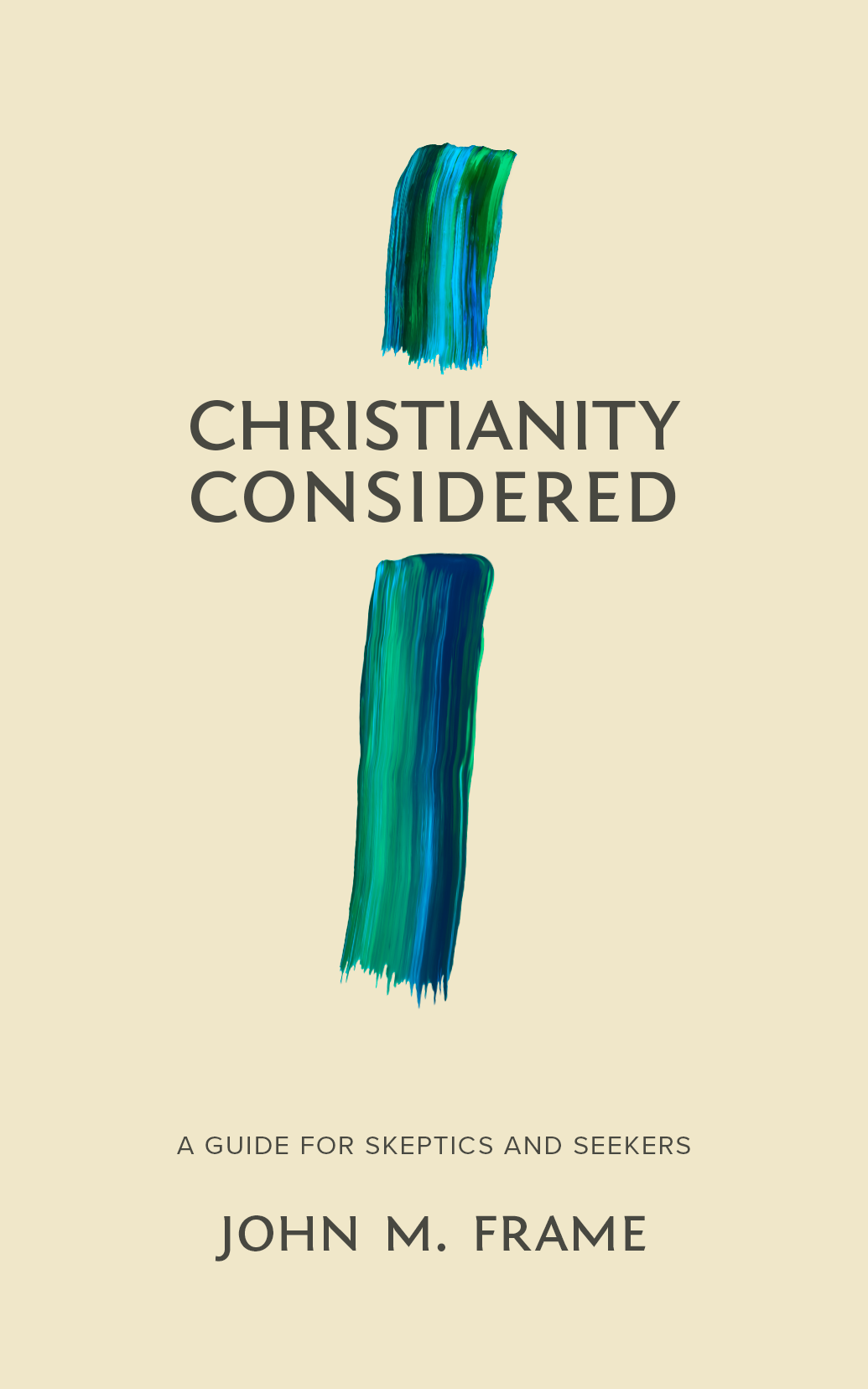
Christianity Considered: A Guide for Skeptics and Seekers
- Author: John Frame
- Publisher: Lexham Press
- Publication Date: 2018
- Pages: 128
Christianity is more than a religion: it is also a complex intellectual tradition.
Christians and non-Christians alike who want to understand the world as it is today have to understand Christianity too. Christianity makes objective claims, but also presents a new way of thinking about the world. In Christianity Considered renowned theologian John Frame introduces the reader to the Christian religion and its unique intellectual framework, describing the key pillars of Christian thought and how these shape the Christian worldview. Covering a range of topics, from the resurrection to the Christian posture toward politics, Christianity Considered is a valuable guide to understanding the Christian faith as an intellectual tradition.
Useful for both the Christian reader looking for a better understanding of the faith and the skeptical reader who seeks to understand the intellectual tradition that has done much to shape the modern world.
Contents:
- Christianity as Intellectual Radicalism
- Why You Are Not Fully Educated Until You Have Considered the Christian Truth Claim
- Why It Seems So Difficult Today to Believe in Christianity
- Believing and Autonomy
- Believing Something for a Reason
- Believing, Willing, Feeling
- The Uniqueness of the Biblical God
- Why Believe in God?
- Right, Wrong, and God
- Right, Wrong, and Believing
- Everything is Evidence for God
- Does God Speak to Us?
- A Holy Book
- The Written Word of God
- Jesus
- The Death of Jesus
- The Resurrection of Jesus
- The Holy Spirit
- Reading the Bible
- Praying
- Going to Church
- The Church in the World
- Religion
- Philosophy
- Morality
- Politics
- Science
- The Return of Jesus
- Epilogue
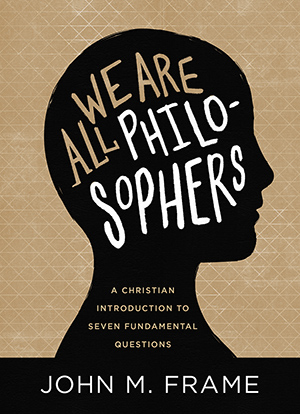
We Are All Philosophers: A Christian Introduction to Seven Fundamental Questions
- Author: John Frame
- Publisher: Lexham Press
- Publication Date: 2019
- Pages: 224
Everyone is a philosopher, and how we live reveals what we most deeply believe.
If you and God were asked the same question, would you both respond in the same way? Are Christians right to believe what we do?
In We Are All Philosophers, John M. Frame takes seven major questions of philosophy and compares the Bible’s answers with common philosophical ones:
- What is everything made of?
- Do I have free will?
- Can I know the world?
- Does God exist?
- How shall I live?
- What are my rights?
- How can I be saved?
We Are All Philosophers carries all the marks of John Frame’s books: he appeals to Scripture frequently and carefully. He writes elegantly and simply, a byproduct of having mastered the complicated philosophical topics he surveys.
Contents:
- What is everything made of?
- Do I have free will?
- Can I know the world?
- Does God exist?
- How shall I live?
- What are my rights?
- How can I be saved?
About the Instructor
John M. Frame (b. 1939) is an American philosopher and a Calvinist theologian especially noted for his work in epistemology, presuppositional apologetics, systematic theology, and ethics. He is one of the foremost interpreters and critics of the thought of Cornelius Van Til. He is currently professor of systematic theology and philosophy at Reformed Theological Seminary, Orlando.